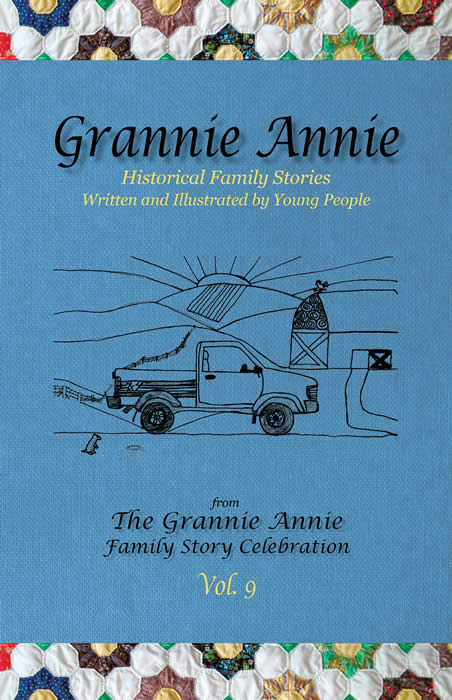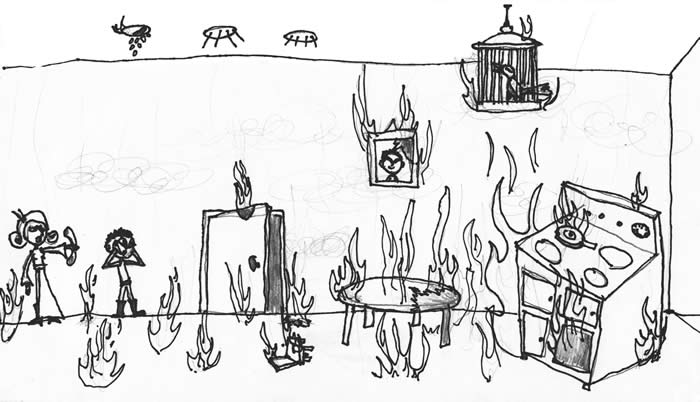Selected Stories from
The Grannie Annie Family Story Celebration 2013/2014
— Stories dated 1978–2000 —
1.
The Magical Box
Luoyang, Henan Province, China; 1978
Beijing, China; 1988
Edwardsville, Illinois, USA; 1990
It seemed like a normal day to a ten-year-old girl in Luoyang, China. The year was 1978. Little did my mom know she would witness magic that would change her life that day — magic from a nine-inch box.
Her dad, an electrical engineer, was fixing up some contraption as usual while she played outside. By late afternoon her father had fixed the small appliance, but from the excited look in his eyes, she knew there was something different about this boxy machine with a nine-inch screen. Her family crowded around to take a look, and when she saw people inside the box her father had fixed, her eyes grew to the size of coins. Black-and-white figures were singing glorious songs and dancing. Oh, how they moved! It was unlike anything the girl had ever seen. It must have been magic, she concluded.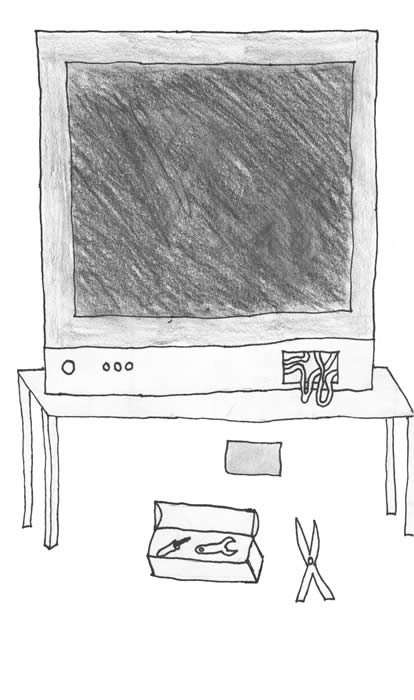
When the magical box had to be returned to its owner, she was extremely sad, for she knew her family could never afford to buy one for themselves. Because of this, she vowed to buy a magical box as soon as she could afford one.
***
Ten years later in Beijing, China, my mom, now a young lady, started working at her new government job. Fresh out of college, she had just begun earning 60 yuan* a month, equal to about $6.67 at the time. At that rate, she knew it would take forever to buy even a small magical box, which cost 4,000 yuan. To buy this childhood dream of hers, she would need to get a job that paid better, and to do that, she would need to go back to school.
But why stop there? She could even move to a better job market — the United States. It would take harder work than she could ever imagine, getting a scholarship in order for her visa to America to get accepted — not to mention the tough competition against countless other students who wanted to live the American dream just as much as she did. That didn’t scare her though. Instead, it made her study harder, dream bigger, and never stop until she reached her goal.
***
In a foreign country far away from her culture, family, and friends, a determined young woman sat in her dorm room the winter of 1990, watching a brand-new nineteen-inch magical box. At the very least, it had taken lots of waiting, a frightening plane trip, an assistantship teaching undergraduates, and $200 of hard-earned money to get this magical box of her own. Without her relentless courage to pursue her dream of a better life in America, she would never have been able to have the magic of images, voices, and music before her eyes — and this time in color! It was more rewarding than she could ever have imagined.
* Pronounced yoo-AHN.
Victoria Sansone; Missouri, USA
Illustrator:
Teagan LeVar; Missouri, USA
2.
Blizzard Blunder in Boston
St. Louis, Missouri; Hanover, New Hampshire; Boston, Massachusetts; USA; 1981
It all began in 1981, when Nana was eating her daily bologna sandwich on white bread at my grandma Judy’s house. The phone started ringing. Ring-a-ling-a-ling! It was my aunt Lori at Dartmouth, where she went to college. When my grandma Judy hung up, she told Nana, my great-grandmother, to start packing for a one-day trip to Dartmouth. Aunt Lori was going to be in a play!
“When’s the play?” croaked Nana, as she readjusted her crooked wig.
“In two weeks,” said Grandma Judy.
Fourteen days later they hit the road — and the air. They got to Dartmouth safely and enjoyed the play.
It was time to leave. It was late November, so it was getting dark early. Nana and Grandma Judy had to drive two and a half hours to Logan Airport in Boston, then had to catch a 6:00 p.m. flight back to St. Louis. Of course, for my grandma Judy, who was a very slow driver, two and a half hours meant four hours.
When Nana and Grandma Judy got into the car and started to drive, buckets of snow began falling from the sky. A huge snowstorm was coming their way!
“Oh my!” exclaimed Grandma Judy. “I can’t even see the road.” All poor Grandma Judy could see was snow and glimpses of the car in front of her. She took a risk and followed that car, with high hopes that it would lead her to Logan Airport.
Then my grandma Judy asked Nana, “Can you drive, because I can’t see the road and it’s getting harder to see the car in front of me.”
“No! I’m eighty-five, blind in one eye, and I can’t even see well on a bright summer day — let alone in a snowstorm. Plus, I got my driver’s license taken away last week,” squawked Nana.
At this point it was snowing so hard that Grandma Judy could not even see the car in front of her. The highway seemed to end. My grandma Judy came to a stop. She could not move on. She heard sirens. She saw something other than snow: red and blue lights — the type you see on top of police cars. Suddenly a big, gruff policeman appeared before Nana’s one good eye.
“Uh-oh,” said Nana, as she tapped Grandma Judy and pointed to the policeman.
The policeman had guns in his holsters. He said, “Ladies, do you know where you are?”
“Well, not really. We got lost in the snowstorm,” said Grandma Judy innocently.
The policeman looked at Grandma Judy and Nana, with her wig askew, and realized that they were not terrorists. Then the policeman told Nana and Grandma Judy that they were on the runway of the Logan Airport airfield.
“The runway? Isn’t that dangerous?” cried Grandma Judy.
“Oy vey,”* sighed Nana.
After interrogating Nana and Grandma Judy, the gruff policeman led them off the airfield. Look on the bright side (not the snowy side) — at least they made it to the airport in time.
* Oy vey (oy-vay) is a Yiddish expression of irritation, sorrow, or distress, similar to “Oh no” or “Good grief.”
Belle Gage; Missouri, USA
3.
The Fire Bird
Santa Ana, California, USA; c. 1983
One very hot day, Vu was on his way home from school when he heard a strange sound coming from the bushes. He looked to see what it was. It was a baby sparrow!
Vu didn’t know where the mother was, so he decided to make the bird his pet. He took it home and fed it, groomed it, let it loose in the sunroom, played with it, made it a home, and even tried to talk to it.
Then as night fell, everyone in the house went to bed. Vu slept in the living room to be near the sparrow, because his parents didn’t let him take the bird to his room.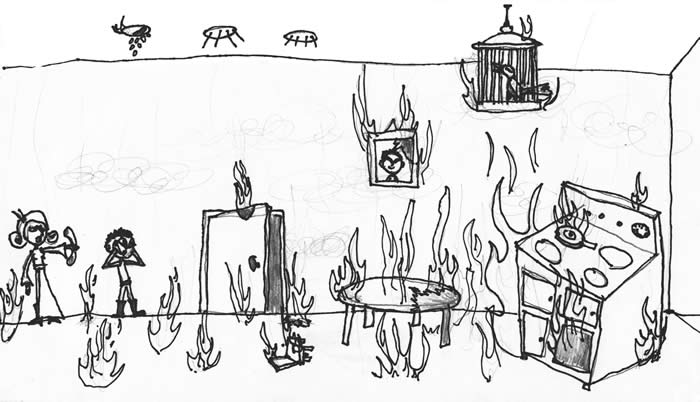
“Tweet! Tweet!” the bird screeched as smoke rose into the air. Vu woke up to find that when his mother had gone to bed, she had forgotten that she was cooking. She had left the electric stove on, and it started a fire.
“Fire!” Vu screamed. Everyone dashed into the room. His mother called the fire department. They all went outside to wait for help.
Sirens drew closer. Vu’s sister, Vi, was screaming, “Over here! Over here! See the smoke?” She was yelling toward the fire truck that had just entered their neighborhood. The firefighters put out the fire, but couldn’t save the bird.
The bird had saved Vu and his entire family that night, but now the bird was gone. Vu felt proud, sad, happy, and guilty. He was proud because his bird saved him. He was very sad because his bird died. He was happy because his family was safe and okay. He felt guilty because he felt like he should have taken the bird outside, too.
Even now Vu still misses the bird, but he treats others better than before because of what the bird did for him.
Aaron Do, son of Vu; New Jersey, USA
Illustrator:
Christian Bigler; Missouri, USA
4.
Tennis Switcheroo
Wichita, Kansas, USA; 1984
Bounce . . . bounce . . . bounce.
John McEnroe served the ball. His opponent skillfully hit the ball back: crosscourt, back, forth, back, forth, volley, lob, overhead, down-the-line. Who was the opponent of temper tantrum thrower John McEnroe? My dad! Fourteen-year-old Steve Talbott.
It all started when my dad was asked to be a ball boy for a tennis exhibition match between the famous John McEnroe and Vitas Gerulaitis in the Wichita, Kansas, coliseum. My dad’s jobs were to chase down the balls and to post the scores on the manual scoreboard. After running in the burning sun, my dad was dripping sweat and feeling a little upside down as he sprinted to the courtside scoreboard and placed the “4” scorecard upside down.
Vitas Gerulaitis looked up and saw the upside-down 4. He started pointing at the scoreboard, and my dad was very confused. Then Vitas did the strangest thing. He jogged over to my dad and handed him his wooden Wilson tennis racket and told him to go play against the famous temper tantrum thrower, John McEnroe. Then Vitas went over to the scoreboard to keep score!
My dad leaped onto the tennis court. The crowd went wild. McEnroe served, soft and easy. He didn’t know if my dad was a good tennis player. My dad slammed it back. John McEnroe’s jaw fell wide open.
Crosscourt, down-the-line, volley, lob, overhead, back, forth, back, forth . . . Smash! My dad won the point. (Of course, John McEnroe had played easy on him.) The crowd went crazy again.
Vitas Gerulaitis grabbed for his racket, but my dad shooed him back to be the ball boy. The crowd was bursting with laughter.
The next day the story of my dad playing John McEnroe was printed in The Wichita Eagle-Beacon newspaper. My dad has the article in a frame. He told me he will treasure it forever. Maybe when I’m older he’ll give it to me, since I wrote this story.
Meredith Talbott; Missouri, USA
5.
A Geyser for Mother
Fuquay-Varina, North Carolina, USA; 1985
One fall afternoon the whole Woodard family was doing chores. All except one — Matthew — who was playing video games. Soon his mother found out and told him to go clean out the gutters because they were clogged with leaves.
Matthew got the ladder from the garage, got on the roof, and started to clean the gutters. He did this for an hour, but he had made barely any progress. He hated cleaning out the gutters, because the leaves were very soggy; he also got stung by a bee that had made a hive in the leaves. He really wanted to go back to playing video games.
Matthew went back to the garage and looked for something to make the job go faster. First he found a rake. It was faster, but the rake scraped the gutters. He went back to the garage and found exactly what he needed — a leaf blower.
Matthew climbed up on top of the roof with the leaf blower. It worked perfectly! He was getting the work done ten times faster. Before long, the gutters were clear of leaves. This was easy, he thought. He was about to climb down from the roof, when he saw a pipe sticking out of the roof a few feet away. Matthew guessed that it needed cleaning, too.
Matthew walked to the pipe and looked down. It was dark inside. He guessed that it was dark because it was clogged with leaves, just like the gutters had been. He held the leaf blower up and stuck the end of the blower into the pipe. He pulled on the trigger, and the motor raced. He didn’t know how long he should gun the motor. It was a question on his mind when from somewhere within the house he heard a distant scream.
Matthew climbed down the ladder. He looked in the kitchen window and saw his brothers and sisters racing toward the back of the house. I wonder what is up with them, he said to himself. He went inside.
In the bathroom his mother was lying on the floor. Her panties were around her ankles. Water was all over the floor.
Matthew’s mother had been on the toilet, and the air pressure from the leaf blower had pushed the water up out of the toilet* and made a geyser for mother.
* The pipe on the roof was a vent for the sewer line, so air blown into the pipe came up through the toilet.
Bray B. Woodard, daughter of Matthew; North Carolina, USA
6.
From the Heart
Cleveland, Ohio, USA; 1987
“You’re not smart enough,” the college counselor stated as my father’s dreams of being a doctor slowly faded. The plump man that smelled like overused cologne watched as my father took in this news. Embarrassed, my father felt tiny in his petite chair. He rose without saying a word, and dragged out of the big, stuffy office, discouraged about entering medical school and becoming a doctor.
We don’t have enough money to send me there anyway, he tried to convince himself as he walked down the high school hallway. Little did he know that the counselor was wrong about his future.
Six months later my father sat in a hard wooden pew, hymns echoing from the white walls. The gold chandelier sparkled from the high ceiling of the church. My father thought about everything that had happened that year. Outside the window, flowers bloomed in the crisp spring air. “Doug,” his dad said, “I was talking to my friend, about your predicament, and he told me that you could watch him perform an open-heart surgery!” Filled with excitement, my father could only imagine what that would be like.
Two days later my father stepped into the surgery room, which smelled like human organs. It seemed like an eternity before he was finally “scrubbed in.” Each person had a job and hustled to see it through. Finally everyone was ready, and surgery began.
First they gave the patient a shot and told him to count to ten. He made it only to four before he was out like a light. Then they opened up the chest, but before they put the heart machine on the man, the doctor said, “Doug, would you like to touch the heart before we begin?”
My father set his hands on the heart, and was filled with awe at this fragile, yet amazingly strong, heart — pumping in his hands. All the other bustling was shut out, and all he could hear was the pumping of the heart. At that moment he knew that no matter what other people said, he was going to become a doctor. He would study and work like he never had before. He carefully withdrew and watched as the skilled doctor and his assistants put the big heart machine on like they had done it a million times.
After spring break the next week, my father returned to school determined — and ready for what lay ahead. He would work hard to achieve his goal, and finally, after eight years of sleepless nights cramming — but never forgetting his goal — he graduated. Finally he stepped up to the stage at his graduation ceremony and received his degree. His family cheered for him like crazy. After he was done shaking everyone’s hand, he headed toward his family and relatives. “Congratulations!” they all shouted.
Then he thought about that doctor who had let him touch a beating heart and who had believed in him when no one else had. That one act of encouragement changed his whole life.
Kate Pogue; Missouri, USA
7.
Equals
Cape Town, the Western Cape, South Africa; 1988
It was 1988, and my father was in Cape Town, South Africa. My father, Paul, went to the University of Cape Town, and he was seventeen. At that time black people in South Africa were treated wrong — they didn’t have rights. Nobody knew that six years later so much would have changed.
The university my father went to was a mix of white and black people. My father had never mixed with black people before, because of segregation. In the dorm next to my father’s there lived a black person. His name was Potiphar. He had been named after a captain of the pharaoh’s guard in the Bible, and he came from a town called Soweto. Potiphar was the first black person that my father had ever really spoken to.
Over time my father and Potiphar developed a friendship. They used to talk, but it was difficult to understand each other, because my father spoke English and Potiphar spoke Xhosa.* They would jump into each other’s rooms and pretend to tackle each other. They realized that they had the same hopes and dreams as each other. The country they had grown up in had made them think they were quite different, when really they were not. They were different colors on the outside but were the same on the inside.
Being friends with Potiphar made my father realize how unfairly and how wrong black people had been treated. You don’t always think about it until you meet someone it affects.
Potiphar risked much for his friendship with my father. He was a good marathon runner, but he could not run in a university marathon, because the black student body was mad at him for being friends with my father. He could not run in the marathon, because he had made friends with a white. The black students were angry about how they had been treated by white people.
After being at the university for a year, my father had to move on to another college. At that time my father lost contact with Potiphar. However, my father never forgot him, and it has been about twenty-four years.
Soon things started to change. White people were starting to change their minds about black people, and black people were changing their minds about white people, just as my father and Potiphar had. In 1992 white people in South Africa voted to ban segregation.** In 1994 South Africa voted in its first black president. His name was Nelson Mandela, known fondly to his people as “Madiba.”*** The rest is history.
* Xhosa (KOH-suh) is a Bantu language spoken by more than seven million people in South Africa.
** Eighty-five percent of eligible (white) voters voted, with nearly seventy percent of them voting to end segregation.
*** Madiba (muh-DEE-buh) was Mandela’s clan name. To the Xhosa people, using the clan name is an important sign of respect and affection.
Mia Jardine; New Jersey, USA
8.
Gang Shoes?
Birmingham, Alabama, USA; 1997
My mother, Jahan, was walking to school in her birthday present. She was in new, shiny skateboarding shoes. Little did she suspect she was violating school policy just by wearing them. They were black and white, and her best friend, Ann, had almost the same pair as she did. When they got to school, they were stopped immediately by their homeroom teacher. “What kind of gang are those hideous shoes from? Detention for both of you!” she scolded.
You may be thinking, Well, detention cannot cause any pain whatsoever. WRONG!!! In my mother’s school, detention meant students standing with their knees locked until they fainted. I know what you are thinking — that’s inhumane and brutal. But it’s true.
When Ann and my mother went to the detention room, they were greeted by the other victims of the cold-blooded and vicious punishment. Before detention started, the other kids were crying or sitting with their heads down on their desks. Some people wore green socks, and others had their hair in side ponytails, which were apparently violations. Many other people wore one pant leg rolled up, which was an actual gang sign. Others wore green or red shoelaces, which was also a gang sign, but they didn’t get in trouble.
When the other kids in the room saw that Ann and Jahan just got there, they all asked if Ann and my mother could faint for them. If someone fainted, that meant
that everyone could sit until they got picked up by their parents. Of course, they both accepted, because being at home or the emergency room surely beat standing for hours at a time for no reason.
Then suddenly the door swung open, crashing into the wall behind it, almost falling off its hinges. “Detention has started, you delinquents. ABSOLUTELY NO TALKING!” screeched the detention teacher. As the teacher was checking names, the boy who was usually there scratched his head, making the school-wide symbol that meant “make it look natural.”
After about an hour of standing, Ann fainted. No one noticed, because the teacher was asleep. My mom was surprised that it wasn’t she who fainted first, because it was her first time and Ann’s fifth. But after another hour, her body finally gave in to the cruel and unusual punishment.
When my mom got home, she was in big trouble with her parents. Because of that, she decided to go to school the next day wearing her old tight shoes.
That next day Ann wasn’t at school. My mother started to panic because her friend was out of her sight. After school she called Ann and asked her what was wrong. Ann said that her mom had a very long and detailed talk with the principal, and he was very angry with her and her mom. She didn’t want to feel the wrath of the principal again, so she got permission to stay home.
That day my mom agreed that she would never wear those shoes to school ever again.
Rowan Khazaeli; Alabama, USA
9.
Lost and Found
near Pueblo, Colorado, USA; c. 2000
My name was “Misty,” but now it’s “Ginny.” I am a twelve-year-old black lab. When it happened, I thought I would never have a family again. But I am getting ahead of myself. Let me start at the beginning.
It was a warm summer day with a cool breeze from the east. The smells of maple and pollen mixed into a harmony in the air. My people called my name to go into the car. I jumped in eagerly, hoping they’d take me to the lake! Instead they took me to a hillside. Still hoping we’d play ball, I jumped out, and the door closed. As the car drove away, I sat — scared and confused. I was lost.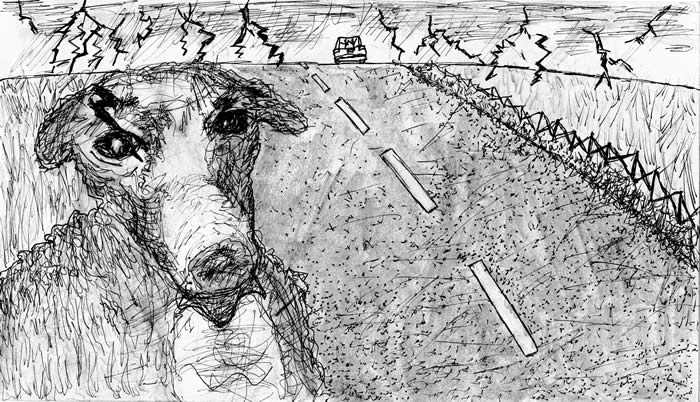
After hours, I got up and left to find food and water. My secret stash of water was a lake not far from where they left me. There were plenty of rabbits, mice, and rats that I could feed myself for weeks. One day when I was walking around, I came upon a peculiar structure. There was a tall stick which had strange strings that looked very poky. I ran up to the peculiar structure and barked at it. It did not move. It smelled metallic. I ran closer. The smell made me feel threatened, and I snapped at it. I bit down on what I thought to be string. Seconds after I bit it, it bit me back! The roaring pain exploded from my mouth to the bottom of my legs. I tried to pull away, but I couldn’t. I was stuck.
I’m not sure how much time passed, but it felt like forever. I saw a white truck with many different pictures on it. It was an animal control truck. As soon as the man saw me with my tongue stuck on the barbed wire, he got his tools, released me, and put me in his truck. I felt happy and scared — it wasn’t a good mix. I was scared because the truck smelled like other animals, but I was so happy to be with a person again!
We arrived at a small building. The people looked very serious, and looked at me with sadness in their eyes. “We can’t treat her. It’s infected. We’ll have to put her down,” said one of the employees.
“But she’s so sweet. Let me make a phone call,” pleaded another.
Two days later a woman who smelled of dog treats walked into the room and looked straight at me. She said, “Everything’s going to be okay. You’re coming with me now. You are rescued.” She took me to the dog doctor, who removed a bit of my tongue to fix the infection. I lived with the woman, her dog, and her family for several months.
Later that fall she took me to a little house in Broomfield, Colorado. The door opened, and there were a mom, a dad, and two kids. It was love at first sight. I was finally found.
Lucy Sherman, younger “sibling” of Ginny; Colorado, USA
Illustrator:
Joshua C. Bowman; Missouri, USA
Read additional stories from the 2013/2014 celebration:
Sneak a peek at Grannie Annie, Vol. 9 |





